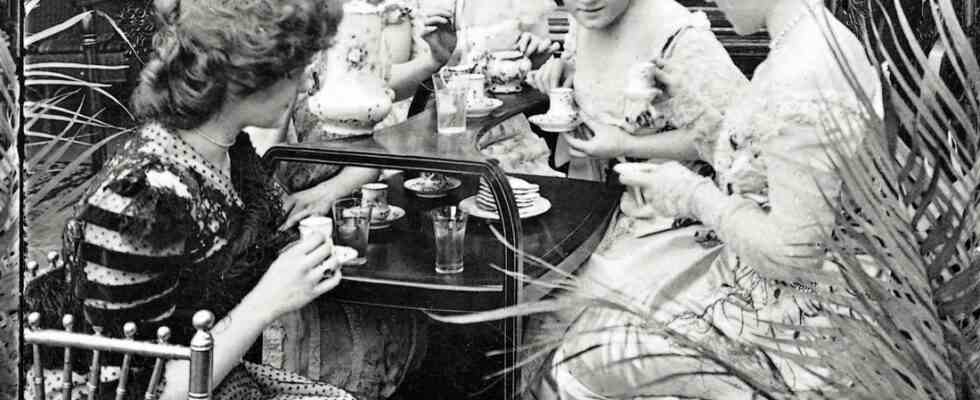What does beer consumption have to do with women’s rights? A surprising amount if you follow the author Claudia Teibler into the past. More than a hundred years ago, women didn’t have many opportunities to work, let alone to fulfill themselves: upper-class women should please stay at home while bored. The women from the lower classes, forced to work by poverty, often ended up as waitresses in the hospitality industry – but the job was nothing compared to today. The taverns were open from morning to night, working hours of 14 to 19 hours a day on six to seven days a week were not uncommon. To make matters worse, beer consumption was five times what it is today and “the majority of the guests were constantly drunk”. Is it any wonder that 200 waitresses, supported by the women’s movement, founded the “Munich Waiters’ Association” in 1900 to represent their interests?
Always happy Schützenliesl? This is suggested by a picture by Friedrich August von Kaulbach. But the job of a waitress was once much harder than it is today, as the author Claudia Teibler describes. In 1900, the waitresses finally organized themselves into an association.
(Photo: Painting by Friedrich August von Kaulbach/Royal Privileged Main Rifle Company Munich 1406)
This is just one of the most varied aspects that Teibler examines in her book “The Bavarian Suffragettes” (Elisabeth Sandmann Verlag) has gathered. A lot has been written in recent years about the beginnings of the women’s movement in Munich and Bavaria; there were exhibitions and theatrical performances. Pioneers like Anita Augspurg and poets like Marie Haushofer are also highlighted again in this book. But this time the spectrum is particularly broad, thematically as well as in time and space. Teibler also pays tribute to the courageous politician Toni Pfülf, the Nuremberg sociologist Julie Meyer, the mathematician Emmy Noether from Erlangen and the resolute “Simplicissimus” landlady Kathi Kobus. In general, she focuses on “female experts in gastronomy and enjoyment” – and there is a reason for that.
It’s in the Café Luitpold. This “Feenpalast”, as the sophisticated coffee house on Brienner Strasse in Munich was called soon after it opened in 1888, offered women better working conditions than other inns. In view of the “festive, palatial character”, not only did the guests behave better, as Teibler described at a book launch there a few days ago, the waitresses had a better standing overall, whether they acted as “water girls” or experienced “coffee chefs”: ” Women could develop more here.” It goes well with the fact that the first general Bavarian women’s day in 1899 took place in Luitpold – after all, the women’s rights activists also wanted to be seen.
In 1888 the Café Luitpold opened in Munich – a sophisticated “fairy palace”.
(Photo: Süddeutsche Zeitung Photo)
The fact that the history of the Luitpoldblock is closely linked to emancipated women is made clear not only in the book, but also in a – really very small – exhibition there. In the course of its history up to the present day, style-defining female owners have shaped the café again and again. Women like Lonny van Laak also ran a cinema or hat and flower shops here early on. And next door worked, for example, Margarete Ammon (who died recently at the age of one hundred), who was involved in the reconstruction of Munich with the real estate company Kithan after the war and later founded a foundation that promotes facilities for women in particular.
And so one is amazed when reading about many a portrait of inspiring artists or entrepreneurs who were involved in a wide variety of places in Bavaria. They were not always rewarded for this; on the contrary, a Jewish writer like Carry Brachvogel, a doctor like Klara Oppenheimer from Würzburg, expected persecution and death during National Socialism. And the fight for women’s rights has not ended to this day, issues such as equal rights or self-determination over one’s own body remain topical. “How brave you are we actually?” asks publisher Elisabeth Sandmann when she mentions the current protests in Iran. “We’ve achieved a lot, but we’re about to lose a lot again,” she says. “Nothing can be taken for granted.”
Claudia Teibler: The Bavarian Suffragettes (Elisabeth Sandmann Verlag, 176 p., 25 euros). Small exhibition in the Café Luitpold Collection, Brienner Straße 11, until Feb. 28, Mon-Sun 10 a.m.-7 p.m. Large accompanying program, see luitpoldblock.de

